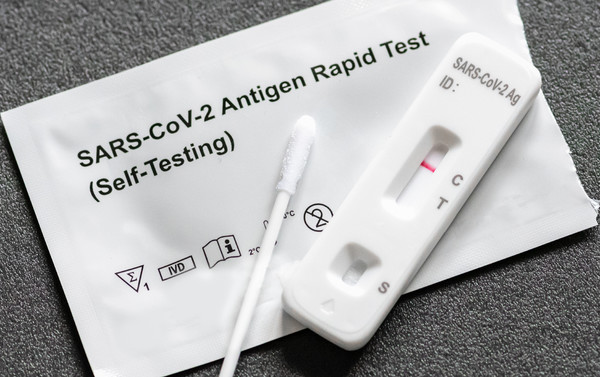The health authorities shifted the focus of Covid-19 diagnosis from PCR tests to rapid antigen tests, but the distribution of unverified and inaccurate testing devices aggravated pandemic control problems.
The Ministry of Food and Drug Safety (MFDS) hastily granted marketing approval for rapid antigen test kits only based on data submitted by manufacturers and did not monitor the market performance, healthcare providers said. Due to the lack of post-marketing surveillance, some testing devices with sensitivity failing to reach 20 percent are being used as official diagnostic tools in the clinical field.

So far, the MFDS has authorized nine Covid-19 home test devices and 24 rapid antigen diagnostic reagents for professional use. Among the nine self-test kits, six obtained the license in February. Among 24 kits for professional use, five won the nod this year.
A specific rapid Covid-19 test kit, manufactured by "A" company, has “too low sensitivity,” doctors said.
According to a German study that evaluated and compared the sensitivity of 122 CE-marked rapid diagnostic tests for Covid-19 antigen, the company's product had 16.7 percent sensitivity, missing the sensitivity criteria.
In another German study that analyzed seven rapid antigen tests, the device detected the virus from only four out of 45 samples, showing a low sensitivity.
The company emphasized that the locally authorized self-test kit was an improved version from the one that had been evaluated by German researchers. This product received MFDS approval based on 100 percent specificity and 90.2 percent sensitivity.
Other kits other than this company's products have confirmed a sensitivity of more than 90 percent under the approval of the Ministry of Food and Drug Safety. Despite such figures, in the actual medical field, some physicians have stressed that even though rapid antigen test has low sensitivity, certain products have much lower sensitivity than others.
Such physicians have pointed out that because there is no post-evaluation system, there is no way to expel kits with poor performance, which further lowers the reliability of rapid antigen tests.
Professor Hong Ki-ho of laboratory medicine at Severance Hospital said rapid antigen tests are “a double-edged sword.”
People can get easily tested using rapid tests, but they might miss the detection in the two to three days of the early stage of infection, which is why the authorities should tighten viral curbs first, he said.
Hong leads the Covid-19 response task force of the Korean Society for Laboratory Medicine (KSLM).
Although the MFDS said commercialized rapid test devices showed excellent performances, which was not true, Hong said. “The MFDS reviewed only submitted documents. It has no post-marketing evaluation tool,” he said.
Most of the self-test kits in Korea were approved in February, but they were not properly verified, he went on to say. “In the German study, no Korean product received a good grade, and some failed to meet the criteria.”
Hong criticized the government for approving rapid test kits too easily and delaying the introduction of large-capacity automation equipment for enhanced PCR tests.
“Because medical institutions have many patients with underlying diseases and those vulnerable to infection, they have to detect Covid-19 early through accurate and rapid tests and actively use antiviral agents and neutralizing antibodies,” he said. “Still, the government hasn’t invested in this.”
Korea has to import automation equipment that can run PCR tests in large quantities, but the MFDS has not authorized it, he went on to say.
KSLM also urged the government to consult with experts to expand highly accurate PCR tests.
The society also said the MFDS should introduce automated PCR equipment through accelerated review, ask doctors to use oropharyngeal smear samples, and redirect manpower and resources for non-essential examinations to Covid-19 PCR testing.
The pre-requisite for using self-test kits is a strict quarantine control, Hong emphasized.
“As 80 percent of home antigen tests can miss the detection of infection, we should be prepared for this error,” he said.
Health experts also pointed out that the government has not been transparent about the self-test kit approval and authorization process criteria. As a result, some said home test kits rammed through the MFDS despite the opposition from the Korea Disease Control and Prevention Agency (KCDA) or the KSLM.
One professor at a university hospital said the government does not seem to have a system to manage rapid antigen diagnostic devices.
“KSLM said the group did not participate in the government’s setting up of the criteria for self-test kit approval. So I don’t know how the government did it,” he said. “This is something big enough to be a scandal.”

